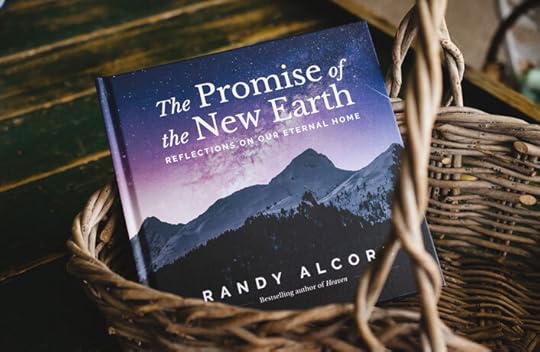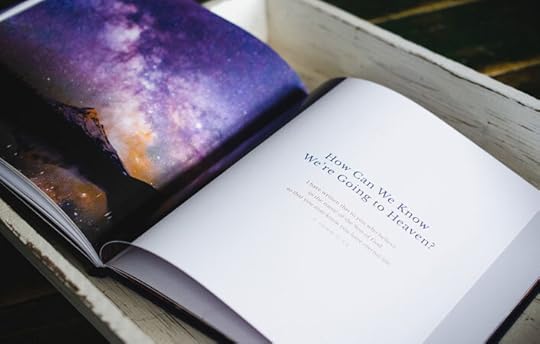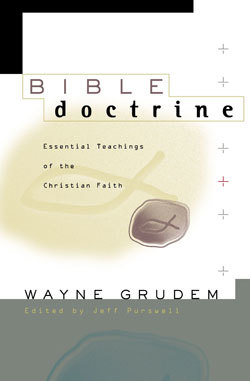Randy Alcorn's Blog, page 48
October 17, 2022
God Is as Just and Holy as He Is Loving

In order to understand God’s love in our current culture, it’s necessary to distinguish what love doesn’t mean and to see it in relationship to God’s other attributes. Yes, God is love, but it is not His only attribute, nor is it always His defining attribute. More and more we hear that God’s love overshadows all His other attributes, as if the rest have only secondary importance.
Gregory Boyd writes, “God is unsurpassable love. The foundational difference between the true image of God and every version of the serpent’s lie is that Jesus Christ first and foremost reveals God as unsurpassable love: ‘God is love.’... The most fundamental distinguishing characteristic of every false picture of God is that it qualifies and compromises the truth about God’s love.”
Unfortunately, this viewpoint guarantees that affirmations of God’s holiness or justice, which also should never be qualified or compromised, will appear to qualify and compromise God’s love.
God is loving, but He is not only loving. Isaiah says, “I saw the Lord seated on a throne, high and exalted.... Above him were seraphs, each with six wings.... And they were calling to one another: ‘Holy, holy, holy is the LORD Almighty’” (6:1–3). Notice that the angels before his face day and night do not cry, “Love, Love, Love is the LORD Almighty.”
Lest we believe that God’s love in the New Testament eclipses His holiness in the Old Testament, the final book of the Bible reveals the present and future in a picture similar to Isaiah’s vision: “Each of the four living creatures had six wings and was covered with eyes all around, even under his wings. Day and night they never stop saying: ‘Holy, holy, holy is the Lord God Almighty, who was, and is, and is to come’” (Revelation 4:8).
God did not cease to be uncompromisingly holy when Jesus came into the world. God’s eternal character does not change (see Malachi 3:6; James 1:17). That means the following Old Testament declarations remain just as true now as when they first appeared in Scripture:
Who is like you—
majestic in holiness,
awesome in glory,
working wonders? (Exodus 15:11)
Who can stand in the presence of the LORD, this holy God?
(1 Samuel 6:20)
Your ways, O God, are holy. (Psalm 77:13)
Exalt the LORD our God
and worship at his footstool;
he is holy....
You were to Israel a forgiving God,
though you punished their misdeeds.
Exalt the LORD our God
and worship at his holy mountain,
for the LORD our God is holy. (Psalm 99:5, 8–9)
Of course, holiness is not God’s only other attribute, which makes it all the more important that we refuse to reduce Him only to love. But we can distinguish holiness from love, so it serves as a good example. Notice how Joshua appealed to God’s holiness, not His love:
You are not able to serve the LORD. He is a holy God; he is a jealous God. He will not forgive your rebellion and your sins. If you forsake the LORD and serve foreign gods, he will turn and bring disaster on you and make an end of you, after he has been good to you. (Joshua 24:19–20)
To demons, God’s defining characteristic is His holiness. A demon said to Jesus, “What do you want with us, Jesus of Nazareth? Have you come to destroy us? I know who you are—the Holy One of God!” (Mark 1:24).
Only one attribute of God forms part of the name of a member of God’s triune person—not the Loving Spirit, but the Holy Spirit. The angel announcing Messiah’s incarnation referred to all three members of the Trinity. Note the prominence of God’s holiness and power: “The Holy Spirit will come upon you, and the power of the Most High will overshadow you. So the holy one to be born will be called the Son of God” (Luke 1:35).
When Paul alludes to two godlike qualities, the Lord’s righteousness and holiness come to his mind: “Put on the new self, created to be like God in true righteousness and holiness” (Ephesians 4:24).
God cares as much that we share in His holiness as in His love: “God disciplines us for our good, that we may share in his holiness.... Make every effort to live in peace with all men and to be holy; without holiness no one will see the Lord” (Hebrews 12:10, 14).
Excerpted from Randy's book If God Is Good .
Photo by Elijah Pilchard on Unsplash
October 14, 2022
How Can We Keep a Loose Grip on Possessions?

Back in 2019, I was asked to join Kirk Cousins (quarterback for the Minnesota Vikings, and former QB of the Washington Redskins) in doing a fundraiser for Holland Christian Schools, where he interviewed me about various topics close to both my heart and his. One great question he asked was, “How do you keep a loose grip on earthly possessions?”
The idea that our money and possessions belong to us, not God, is a dangerous misconception. Many of our problems begin when we forget that God is the Boss of the universe. But in fact, He is more than the boss; He is the owner.
From beginning to end, Scripture repeatedly emphasizes God’s ownership of everything: “To the Lord your God belong the heavens, even the highest heavens, the earth and everything in it” (Deuteronomy 10:14). When I grasp that I’m a steward, not an owner, it totally changes my perspective. Suddenly, I’m not asking, “How much of my money shall I, out of the goodness of my heart, give to God?” Rather, I’m asking, “Since all of ‘my’ money is really yours, Lord, how would you like me to invest your money today?”
I believe the only way to break our grip on material things is first, to see ourselves as stewards that God has entrusted these money and possessions to, and second, to give. Jesus says, “It is more blessed to give than to receive” (Acts 20:35). As long as I still have something, I believe I own it. But when I give it away, I relinquish the control, power, and prestige that come with wealth. At the moment of release, the light turns on. The magic spell is broken. My mind clears, and I recognize God as owner, myself as servant, and other people as intended beneficiaries of what God has entrusted to me.
I once loaned a new boom box to our church’s high school group. It came back beat-up and that bothered me. But the Lord reminded me it wasn’t my boom box—it was His. And it had been used to help reach young people. Who was I to complain? I also owned thousands of books that I valued highly. I loaned them out, but it troubled me when they weren’t returned or came back looking shabby. Then I sensed God’s leading to begin a church library. I started looking at the names of those who checked them out, sometimes dozens of names per book. By releasing the books, I was investing in other lives. Suddenly the more worn the book, the more delighted I was. My perspective totally changed.
Christ’s words were direct and profound: “Where your treasure is, there your heart will be also” (Matthew 6:21). What we do with our possessions is a sure indicator of what’s in our hearts. Jesus is saying, “Show me your checkbook, your credit card statement, and your receipts for expenditures, and I’ll show you where your heart is.” What we do with our money and possessions doesn’t lie. It is a bold statement to God of what we truly value.
So put your resources, your assets, your money and possessions, your time and talents and energies into the things of God. As surely as the compass needle follows north, your heart will follow your treasure. May God’s people be liberated from money- and possessions-love, break the back of materialism through generous giving to the needy, and pursue the lasting pleasures found in knowing and serving Christ.
See more resources on money and giving, as well as Randy's related books, including Managing God's Money and Giving Is the Good Life .
Photo by Priscilla Du Preez on Unsplash
October 12, 2022
Having Loved Ones in Heaven Makes Our Anticipation of Eternity Stronger Than Ever

Last month I had a conversation over Zoom with Steve Silver of Men’s Golf Fellowship. Steve is a great brother who founded a ministry that uses golf to help men grow in their relationship with Jesus.
Steve’s wife Sandy went to be with Jesus last December, just three months before Nanci died. We can both understand each other’s pain of loss, but also the intense anticipation for and comfort of Heaven now that our wives reside there. Because of the unique way Steve worded some of his questions, they prompted answers I've given to the same questions to come out somewhat differently. He had finished reading the Heaven book, which prompted some of his questions:
What is the difference between the present Heaven and the eternal Heaven?
How are those in Heaven spending their time?
Are our loved ones in Heaven aware of us? Do they think of us?
Who are loved ones in Heaven spending time with? Are they meeting and connecting with those they read about and admired?
Are our loved ones in Heaven getting answers to questions they wondered about here on Earth?
Are those in Heaven able to share their knowledge they had on Earth?
Do those in Heaven miss their loved ones still on Earth?
What will our reunion in Heaven look like?
What does “no more marriage in Heaven” mean for our relationships with those we were married to?
Will our relationships with our earthly spouses still be special?
How has your study of Heaven shaped your perspectives in grief?
What is an appropriate amount of time to give to thinking about Heaven?
How do you want to finish out your remaining years?
Watch our full conversation here:
As I’ve written before, Jesus is Nanci’s best friend and my best friend. She is there with Him, and He is here with me. So Jesus is the bridge that keeps us connected until we live in that new world, with new bodies and minds, that He is preparing for us. The connection I feel to her through Him is profound.
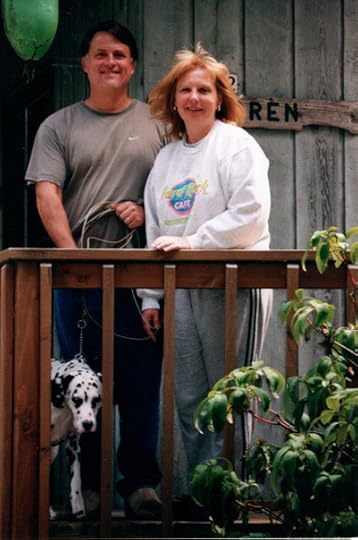 I miss Nanci tremendously, but thinking of her brings me more joy than it does sorrow. I am so genuinely happy for her—so thankful that she finished her life here so well, was so faithful to Jesus, and made such an impact on our family. So as for my grief, there is still missing her, and sometimes heartache and grief, but for the most part, gratitude and an overwhelming sense of God’s grace eclipse regrets and sorrows.
I miss Nanci tremendously, but thinking of her brings me more joy than it does sorrow. I am so genuinely happy for her—so thankful that she finished her life here so well, was so faithful to Jesus, and made such an impact on our family. So as for my grief, there is still missing her, and sometimes heartache and grief, but for the most part, gratitude and an overwhelming sense of God’s grace eclipse regrets and sorrows.
Steve and I talked quite a bit about how our loved ones in Heaven don’t stop caring about their family and friends just because they’re now in the presence of Jesus. Recently there was a special text about one of our grandsons that Nanci would have just been overjoyed to read. She is not here for me to share it with her, but it doesn't mean she's out of the loop. God can do whatever He wants, but in this particular case with her grandson, I strongly suspect that she is aware of it.
We don’t cease to be the people God made us to be when we die. We don’t lose our memories and our love and fondness for our families. And if God lets some people in Heaven know what's going on in some places and times down on Earth, which I believe is clear, shouldn’t we assume He would do that with people related to their beloved children and grandchildren and dear friends? I actually think the burden of proof is on those who do not believe this likely happens, as opposed to those who do believe it.
is it is tough to not share the special emotions and conversations we would be having if Nanci were still here. But again, my belief is that she is actually way more “in the loop” of what God is doing in this world than I am. Heaven is not a place of ignorance, but perspective. This earth is where the great unfolding drama of redemption is happening, and I think the attention of Heaven is often upon that drama.
For more on the New Earth, see Randy’s book Heaven . You can also browse our resources on Heaven and additional books.
Photo by Emmanuel Phaeton on Unsplash
October 10, 2022
Do What It Takes to Have Time with God

Several years ago, when Nanci and I answered questions at the young moms’ gathering at our home church, one of the moms asked, “How do busy people set aside time to rest, reflect, and recharge?” Here are some thoughts about the importance of setting priorities, and saying no even to good things in order to do what’s most important:
In the video, I mentioned my article I wrote years ago: Planned Neglect: Saying No to Good Things So We Can Say Yes to the Best. I said then, and I still believe it to be true: We need to neglect doing the things that countless people want us to do, so that we will be available to do what God wants. Instead of exhausting ourselves doing many secondary things, may we do a few primary things well. And that begins with our daily time with God.
I later wrote a related but not redundant blog: A Lesson Hard Learned: Being Content with Saying No to Truly Good Opportunities. I also wrote on Does It Matter How We Spend Our Free Time? And here’s a short article on understanding the difference between the urgent and the important.
Finally, years ago I wrote about Mary and Martha in an article: Can’t You See That I’m Busy?
Jesus says to Martha in Luke 10: “Few things are necessary, really only one. Mary has chosen the better portion and it will not be taken from her.” May that be true of us too.
Photo by Emmanuel Phaeton on Unsplash
October 7, 2022
How to Escape the Rut of Discontentment

Nanci and I spoke at our church’s young moms group a number of times, and she was always great. One of the questions we answered when we spoke in 2014 was, “How can I escape the cycle of discontentment? What are some practical ways to stop this cycle?”
Nanci gave some ideas and encouragement, and shared some Scripture:
Nanci talked about perspective, and what we choose to dwell on, rather than our circumstances: “Who you are and where God has placed you are something that He has preordained for you. He knows what’s best for you, and He wants you to be fulfilled.”
Here are some great quotes related to contentment to meditate on:
“Satan loves to fish in the troubled waters of a discontented heart.” —Thomas Watson
“This is the secret of being content: to learn and accept that we live daily by God’s unmerited favor given through Christ, and that we can respond to any and every situation by His divine enablement through the Holy Spirit.” —Jerry Bridges, The Practice of Godliness
“Christian contentment…is the direct fruit of having no higher ambition than to belong to the Lord and to be totally at His disposal in the place He appoints, at the time He chooses, with the provision He is pleased to make.” — Sinclair Ferguson
“For me, true contentment on earth means asking less of this life because more is coming in the next. Godly contentment is great gain. Heavenly gain. Because God has created the appetites in your heart, it stands to reason that He must be the consummation of that hunger.” —Joni Eareckson Tada, Heaven: Your Real Home
“The contented person experiences the sufficiency of God’s provision for his needs and the sufficiency of God’s grace for his circumstances. He believes God will indeed meet all his material needs and that He will work in all his circumstances for his good. That is why Paul could say, ‘Godliness with contentment is great gain.’ The godly person has found what the greedy or envious or discontented person always searches for but never finds. He has found satisfaction and rest in his soul.” —Jerry Bridges, The Practice of Godliness
“If you are not content with what you have, you would not be satisfied if it were doubled.” —Charles Spurgeon
“Contentment, then, is the product of a heart resting in God. It is the soul’s enjoyment of that peace that passes all understanding. It is the outcome of my will being brought into subjection to the Divine will. It is the blessed assurance that God does all things well, and is, even now, making all things work together for my ultimate good.” —A.W. Pink
“Gratitude is a handmaiden of contentment. An ever-growing attitude of gratitude will certainly make us more content since we will be focusing more on what we do have, both spiritually and materially, than on what we do not have. But contentment is more than focusing on what we have. It is focusing on the fact that all we do have; we have by the grace of God. We do not deserve anything we have, materially or spiritually. It is all by His grace.” —Jerry Bridges, The Practice of Godliness
“The best time to look for blessings is when you feel like your life is devoid of them. The enjoyment of God’s pleasures is the outworking of genuine trust in the Lord. This demonstrates authentic contentment. It’s the Lord’s quiet, comforting way of informing you that He remains right here. He sits with you through the countless silent blessings He gives every single day.” —Steve Swartz
Photo by Ethan Unzicker on Unsplash
October 5, 2022
When “Blessed” Means “Happy”
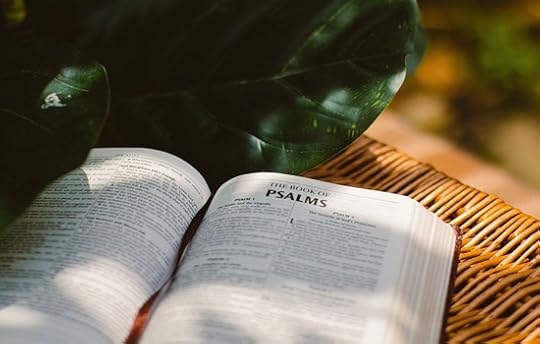
Growing up in an unbelieving home, I never heard the word blessed as a child. After I came to Christ, I heard it often. I didn’t know what it meant; I just knew it sounded holy and spiritual. It was “white noise”—one of many undefined church words whose meanings are masked due to frequent use.
Years later, I heard someone say that in passages such as Psalm 1 and the Beatitudes of Matthew 5 and Luke 6, blessed actually means “happy.” If blessed meant “happy,” I reasoned, why had no one told me that in the hundreds of books I’d already read? And if the Hebrew and Greek really meant “happy,” why wasn’t it translated that way in our Bibles? It made no sense.
Then I started digging for the truth. Many years later I dug deeper than ever while researching my book Happiness. My search yielded rich and surprising discoveries.
Happiness Emerges in the Old Testament
To understand the happiness God offers His creatures, there’s no word in Scripture more important than the Hebrew word asher.
Standard Hebrew dictionaries routinely give happy as the closest English equivalent for asher. Nevertheless, it’s most commonly translated “blessed” instead. Proverbs 28:14 is one of many examples: “Blessed is the one who always trembles before God” (NIV).
Commentaries and study notes explain that the person who fears God is happy. But that meaning would not even occur to most people when they see the word blessed. Of course, had asher been translated “happy” here—as it is more than twenty other places in the King James—readers wouldn’t need commentaries or study notes to understand its meaning.
If you played Password or Catch Phrase and the word was happy, you’d win with clues such as “joyful,” “glad,” “cheerful,” and “delighted.” But suppose someone offered you the clue “blessed.” Would happy pop into your mind? More likely you’d respond by saying “fortunate” or “holy.” And when you found out the key word was happy, you’d probably say, “Huh?” and wish for a different partner.
What Does the Word Blessed Mean Today?
There are millions of online references to the “Blessed Virgin Mary.” Do most people suppose this means the “Happy Virgin Mary”? No. They would naturally think of the “Holy Virgin Mary.” Likewise, upon hearing of “the blessed sacrament,” few would think it means “the happy sacrament.”
In the Merriam-Webster Unabridged Dictionary, the first synonym listed in the definition of blessed is “of, relating to, or being God.” The second definition is “set apart or worthy of veneration by association with God.” The synonyms include “consecrated, hallowed, sacred, sanctified.”
Every definition and synonym cited for blessed relates to holiness. Virtually nothing relates to happiness, though a few dictionaries acknowledge that it once meant “happy.”
I asked people on my Facebook page, “What comes to mind when you hear the word blessed?” More than 1,100 responses followed. Some associated blessed with being covered, favored, or having peace and contentment. Others said that blessed means “lucky.”
About 30 percent of responders mentioned “undeserved favor” from God, similar to the way most people would define grace.
Only 12 percent, roughly one out of nine people, made any mention of happiness, gladness, or joy.
Why Do English Translations Shy Away from the Word Happy?
Since the Hebrew word asher (as well as its complement in Greek, makarios) means “happy,” then why isn’t it consistently translated “happy”?
The simple answer is that when the King James Version translators rendered asher and makarios as “blessed,” readers knew that blessed was a synonym for happy. For several centuries after the KJV was translated, blessedness and happiness remained nearly interchangeable in common speech. This is evidenced by the 1828 edition of Noah Webster’s dictionary, which defined blessed this way: “Made happy or prosperous; extolled; pronounced happy. a. Happy; prosperous in worldly affairs; enjoying spiritual happiness and the favor of God; enjoying heavenly felicity.”
My extensive research and dialogue with Hebrew and Greek scholars left me perplexed about why most translators continue to use the word blessed as a translation of asher and makarios.
Though it most often renders makarios as “blessed,” the literally inclined New American Standard Bible translates Romans 14:22 as “Happy [makarios] is he who does not condemn himself in what he approves.”
Why? William Tyndale (c. 1494–1536), a Reformer who translated the Bible into English in the sixteenth century, rendered makarios as “happy” in Romans 14:22, and the KJV followed Tyndale’s example, as it usually did.
But if “happy” is a good translation of makarios here, then why isn’t it translated the same way in the Beatitudes, where Jesus used it with exactly the same sentence construction: “Makarios are the merciful,”? Why do all the major English translations still say, “Blessed are” instead of “Happy are,” despite the fact that in today’s English blessed no longer means “happy”?
The Beatitudes are a commonly known and memorized passage. Many people familiar with the traditional wording would balk at the change, feeling the Bible had been tampered with.
Other Languages Translate Blessed as “Happy”
Experience has shown me that despite all the evidence, some people still push back on the idea that “happy” is the proper translation of asher and makarios. They resist the notion that God is called the “happy God” in 1 Timothy 1 and 6 and that the Beatitudes could be accurately rendered “Happy is the one who . . .”
If this is where you find yourself, perhaps it will be helpful to understand how non-English translations render these words in their own languages.
The United Bible Societies’ New Testament Handbook Series is a twenty-volume set of linguistic insights used by translators worldwide. It helps them best render the New Testament into target languages, including those of people groups who don’t have the Bible in their native languages.
For example, all the bestselling English Bible versions translate John 13:17 similar to the NIV: “Now that you know these things, you will be blessed if you do them” (emphasis added). But here’s what the UBS handbook says about makarios in this verse:
In the present passage, as in most other New Testament passages where this Greek word [makarios] occurs, the focus is upon the subjective state of happiness shared by persons who have received God’s blessing. For this reason, the translation “happy” is preferable to “blessed.”
Dozens of similar comments in the UBS handbooks instruct translators worldwide to translate makarios with the closest equivalent to “happy” in their target language.
These guidelines have been followed for decades by innumerable translators. The result is that thousands of people groups all over the world know what relatively few English readers know—that the passages containing makarios (as well as its Old Testament Hebrew equivalent, asher) normally refer to being happy in God. (Wouldn’t that be a great thing for English Bible readers to know too?)
I find it remarkable that all of the top seven bestselling English translations usually translate makarios as “blessed,” not “happy.” This means that English-speaking believers are uniquely vulnerable to the myth that most other Bible readers in the world are immune to: that the Bible says nothing about happiness and neither expects nor calls on us to be happy.
Is Happy a Dangerous Word?
I have heard people say it would be “dangerous” to translate asher and makarios as “happy,” because doing so might “appeal to the flesh.”
But wasn’t it up to God which Hebrew and Greek words would be included in Scripture? If these terms are most accurately translated “happy,” who are we to not do so? Isn’t any Bible teacher capable of explaining that this happiness spoken of in Scripture cannot be found in sin but only in God?
Isn’t it easy enough to balance the call to gladness in God by pointing out that this doesn’t entail merely bubbly gleefulness but that we are to “weep with those who weep” (Romans 12:15) and that we can be “sorrowful, yet always rejoicing” (2 Corinthians 6:10)?
Speaking about Christ-centered happiness is fully compatible with pointing out the many passages demonstrating that prosperity theology is wrong, that often our life circumstances will be difficult, and that sorrow and grief are also part of the Christian life.
What’s dangerous is not recognizing the happiness in God explicitly revealed in Scripture.
Other Words Have Cultural Baggage
Many good words are commonly misused and watered down. The word holy has lots of baggage too. To countless people, it means being self-righteous, intolerant, and out of touch with reality. Since people routinely misunderstand it, should we no longer use the word holy?
Likewise, love is commonly used in shallow ways, as popular music has long demonstrated. People say they love hamburgers, rock and roll, hairstyles, and YouTube. They “make love” to someone they barely know.
Since the word love has been so twisted and trivialized, should we remove it from Bible translations? Should we stop using the word in our families and churches?
Of course not. Instead, we should clarify what Scripture truly means by love and holiness, as well as terms like hope, peace, pleasure, and yes, happiness. When appropriate, we should contrast the meaning in Scripture with our culture’s superficial and sometimes sinful connotations.
Happiness Is Good News
The secularization of culture has shrunk the common vocabulary of believers and unbelievers. However, happiness is a word that should still convey rich meaning to both groups. Ironically, it’s only some modern believers who devalue happiness while virtually no unbelievers do. No unbeliever says, “What I most want in life is to be blessed.”
Wouldn’t people be more attracted to the gospel if they were told about what Scripture reveals: a happy God and his offer of a deep, abiding happiness in Christ that begins now and goes on forever? I’m convinced they would.
Obviously the offer of happiness alone isn’t the whole gospel. But since God Himself calls the gospel “the good news of happiness” (Isaiah 52:7, ESV, NASB), surely we should see happiness as a vital part of it.
If seekers read in the Beatitudes, “Happy are those who mourn, for they shall be comforted,” they would probably be struck by the paradox. Happiness and mourning at the same time? How is that even possible?
That’s what Jesus wanted His listeners to realize—He was offering them something counterintuitive, even miraculous, something God given that could never come from human invention or positive thinking.
We desperately need holiness, but it’s happiness we long for. The church shouldn’t retreat from such a significant word that was once central to the vocabulary of God’s people. On the contrary, we should give happiness its proper biblical context, celebrate it, and embrace it as a vital part of the gospel message.
Browse more resources on the topic of happiness, and see Randy’s related books, including Happiness and Does God Want Us to Be Happy?
Photo by Emmanuel Phaeton on Unsplash
October 3, 2022
Heaven Isn’t Just Consolation, It’s Restoration, the Fulfillment of Our Deepest Hopes and Desires

We long for a return to Paradise—a perfect world, without the corruption of sin, where God walks with us and talks with us in the cool of the day. Because we’re human beings, we desire something tangible and physical, something that will not fade away. And that is exactly what God promises us—a home that will not be destroyed, a kingdom that will not fade, a city with unshakable foundations, an incorruptible inheritance.
God has encouraged me with memories of the conversations Nanci and I enjoyed about the world to come. Nanci had what she called her New Earth bucket list, which included her dream to spend a lot of time by the water, playing with dogs and dolphins and other creatures, enjoying the presence of Jesus directly, face to face, and also in His creation. While of course that doesn’t erase the pain of grief and loss, the eternal focus we enjoyed together has made an incredible difference for me.
When I talk with people who have also lost a loved one, I am struck by how often the promise of the New Earth seems absent from their thoughts. They view Heaven only as consolation and the absence of pain and suffering and sin. It’s as if their best days living with their loved ones in a physical realm are all behind them.
We long not only for consolation, but for restoration and the fulfillment of our deepest desires! As Charles Spurgeon wrote, “To come to Thee is to come home from exile, to come to land out of the raging storm, to come to rest after long labour, to come to the goal of my desires and the summit of my wishes.”
What means so much to me is not just the present Heaven, but the promise of resurrection and the New Earth. It’s the promise of unprecedented, global, overflowing good, not simply the absence of bad.
In keeping with Romans 8 and other passages, God’s original plan for righteous men and women to rule the earth to His glory was not thwarted by Satan in the garden but was purchased by Jesus on the cross. That is the wonderful future we have to look forward to: living eternally as embodied people on the redeemed earth and being face to face with our Savior. I envision Nanci and I both falling to our knees to worship Him in His awesome holiness, and also walking and talking with Him as only best friends do.
My heart overflows as I think about Nanci and how we have, for so long, looked forward to the future Heaven on the New Earth. Imagine living life with the risen Jesus and His risen people on a risen earth! Picture worshiping and eating and drinking and serving and playing and laughing and talking! Nanci’s and my best days really do lie ahead. That’s not wishful thinking. It’s the promise of Jesus, purchased by His death and resurrection.
I dedicated my newly released book, The Promise of the New Earth, to Nanci: “To my beloved bride, now with Jesus. What a privilege, my sweetheart, to have lived this life with you. I so look forward to the wonders and glories we will experience together in the world to come, where joy will be the air we breathe.”
Jesus is the primary, everyone else is secondary. But when you enjoy Him as primary, then it opens the door to more fully enjoy all that is secondary. I can’t wait to see Nanci again and have her show me around the present Heaven, and after the resurrection, when we relocate to the New Earth, for us to experience it for the first time together, in the presence of Jesus. How glorious that will be!
Now available exclusively from EPM: The Promise of the New EarthThe Promise of the New Earth combines solid biblical teaching gleaned from Randy Alcorn’s bestselling book, Heaven, with beautiful photography to create a gift book to be treasured.
Many Christians think about the present Heaven, where Christians go now when they die, but have never considered the future Heaven, after the resurrection, which will be a physical place occupied by physical people who will live forever with Jesus and all those who love Him.
One day, those who know Jesus really will experience Heaven on Earth.
This refreshed version of Randy’s book The Promise of Heaven features all new photographs and some brand-new content. It makes a wonderful gift, especially to those who are grieving or need to learn about our eternal hope in Jesus. Hardcover, 96 pages.
The Promise of the New Earth is available exclusively from Eternal Perspective Ministries for $11.99 (retail $19.99). Purchase 10 or more for $9.99 each.
Photo by Jamie Street on Unsplash
September 30, 2022
The Doctrinal Crisis in American Evangelical Churches: What Can We Do?
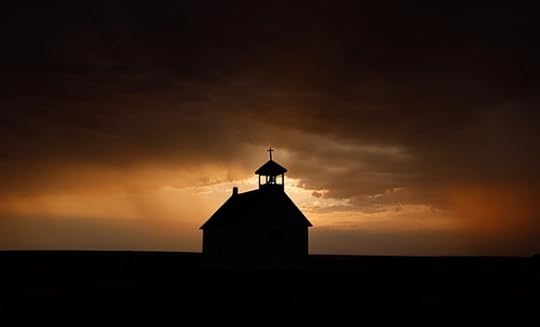
Most readers have likely heard about individuals having a crisis of faith. We’ve learned terms such as “exvangelical” and “deconstruction.” We are sometimes familiar with entire churches, even denominations, who have lost their faith. But while it is not the first to do so, a poll released last week should serve as a dramatic wake up call to evangelical churches and their pastors.
One of several examples: 73 percent of evangelicals who took the poll agreed with the statement that “Jesus is the first and greatest being created by God.” That is the Arianism condemned by church councils which recognized that Scripture teaches the full deity of Christ. While Mormons believe Jesus is the first and greatest being created by God, evangelical Christians historically have believed Jesus is the infinite Creator, not a finite creature. In 325 A.D., based on multiple Scriptures, the Nicene Creed declared, as a refutation of Arianism, that Jesus Christ was “not made” but “eternally begotten” and is “one in being with the Father.”
Eleven years ago, I wrote an article titled, “Does the Word ‘Evangelical’ Mean Anything Anymore?” I said then:
…there are more and more every year who think “There’s no way to know the truth, so let’s not be dogmatic” in areas that God has actually revealed in His Word, which people have given their lives to get into our language so we could know what God has said to us. I feel like right now among evangelicals—including authors, musicians, speakers, and pastors—there’s a runaway train of unbiblical and unclear thinking.
We are improvising theology on the fly with little regard for the Scriptures or the historic orthodox Christian faith. We act as if the Christian faith began with us, and we are perfectly free to modify it in light of the latest cultural winds. To put it bluntly, there is not only more and more false doctrine in churches, there is also more and more of it coming from evangelical pastors and authors and publishers and colleges. (Of course, more and more people aren’t even part of churches these days, but that’s a different story, though related.)
In conclusion, I asked:
Is it reasonable to suggest that there is a point where if you no longer believe that the whole Bible is true, and you deny core truths evangelical Christians historically believed, it is misleading and even nonsensical to continue to call yourself an “evangelical Christian”?
It’s been over a decade, but sadly, the trends I saw in 2011, including the decline of biblical knowledge and the erosion of sound doctrine in churches, have only become more obvious. Every two years, Ligonier Ministries and Lifeway Research partner together to “take the theological temperature” of U.S. evangelicals. The 2022 survey reflected very disturbing trends in the American church. (Christianity Today explains: “Respondents were considered evangelical by belief if they strongly agreed in the Bible as the highest authority; the importance of encouraging non-Christians to trust Jesus as their savior; that his death removed the penalty of sin; and that trust in him alone brings salvation.” You must keep this in mind as you contemplate the poll results—these are not merely self-proclaimed evangelicals, but to have their opinions count, they had to clearly affirm those clear evangelical beliefs. Therefore, while results would vary from church to church, the respondents are generally a fair cross-section of evangelicals.)
Alarming Trends
Other remarkable findings of the survey: when presented with the statement “Jesus was a great teacher, but he was not God,” 43% of evangelicals surveyed agreed (compared to 30% in 2020). This means that more than four out of ten people who claim to be evangelicals don’t believe in the deity of Jesus Christ! (Of course, it would be seven out of ten based on the responses to that question about Jesus being created.) And 56% of evangelicals agree with the statement “God accepts the worship of all religions, including Christianity, Judaism, and Islam.”
26% of evangelicals (up from 15% in 2020)—affirmed the statement, “The Bible, like all sacred writings, contains helpful accounts of ancient myths but is not literally true.” And 38% agree with “Religious belief is a matter of personal opinion; it is not about objective truth.” The percentages demonstrate that these are no mere fringe ideas; they are already prevalent in U.S. churches and are gaining traction at an alarming rate.
37% think that “Gender identity is a matter of choice,” and given the strong trajectory of our culture, and schools in particular, we should expect this number to increase. One encouraging finding was that 94% of evangelicals agree that “Sex outside of traditional marriage is a sin.” I’m also glad to see 91% of respondents agreed with the statement “Abortion is a sin.” (In my opinion, however, many evangelicals do not live consistently with these beliefs, since premarital sex and abortion are more widespread than those figures would suggest. The last study I was aware of found that 25% of women getting abortions indicated they were evangelical Christians.)
The surveyors conclude:
The 2022 State of Theology survey reveals that Americans increasingly reject the divine origin and complete accuracy of the Bible. With no enduring plumb line of absolute truth to conform to, U.S. adults are also increasingly holding to unbiblical worldviews related to human sexuality. In the evangelical sphere, doctrines including the deity and exclusivity of Jesus Christ, as well as the inspiration and authority of the Bible, are increasingly being rejected. While positive trends are present, including evangelicals’ views on abortion and sex outside of marriage, an inconsistent biblical ethic is also evident, with more evangelicals embracing a secular worldview in the areas of homosexuality and gender identity.
Evidence of a False Worldview
This is a revealing survey pointing to a reality that has been heavy on my mind and heart (and that of countless believers) for decades. The number of people in evangelical churches who do not believe basic Christian doctrines is disturbing. In my experience, this comes out frequently in conversations and social media posts, and is far more evident in pastors and church leaders than it was even ten or five years ago.
So what can we do? I believe this doctrinal crisis in evangelical churches needs to be countered not just with biblically based messages, but with a deliberate commitment to the teaching of sound systematic theology. General “Bible teaching” for 30-40 minutes a week, while important, is woefully insufficient to solely address these issues. Why? When people are immersed in the culture’s wrong worldview, church attenders can hear the Bible taught and still see and hear the particular passage through the eyes and ears of that wrong worldview. It’s all too easy to twist or take out of context verses, rather than having their worldview corrected by sound biblical doctrine. (For instance, unless they are explicitly taught otherwise and often reminded, every time those 73% who think Jesus is a created being hear their pastor say “Jesus” they are not thinking of the true Jesus but a false Jesus who is not God.) If we don't somehow reverse the doctrinal decay in our evangelical churches, this dominant trend will continue until the church is indistinguishable from the culture.
Russell Moore explains,
New Testament scholar David Nienhuis makes the point that we have a generation of “Bible quoters, not Bible readers.” Sometimes even the most theologically inclined people know how to use the Bible in debate both inside and outside the church over controversies on gender, predestination, and so forth. But they don’t know the difference between Melchizedek and Mordecai, between Josiah and Jehoshaphat. They see the actual storyline of Scripture as a “minor” detail.
The Bible does far more than answer questions posed to it by current controversies, and far more than just undergird doctrine. The Bible shapes and forms its hearers. …we might have our “values” right-side up and our theology upside down.
Among many things, people need to be taught what the whole of Scripture says about the deity of Jesus, the nature of the trinity, the inspiration and inerrancy of Scripture, and the exclusive nature of salvation in Christ. Those doctrines will be contradicted constantly by the world and mainline denominations. (For more of a commentary on the Lifeway/Ligonier survey results about the beliefs of evangelicals, see this excellent article by Joe Carter.)
A Call for Teaching Systematic Theology
Several years ago, I was asked what I would do differently if I were a pastor today, as I was for fourteen years at two different churches. The answer was easy: if I had it to do over again, I would focus heavily on teaching systematic theology. Our calling is to “teach what accords with sound doctrine” (Titus 2:1).
I would use some of the great resources we have today (including Wayne Grudem’s Bible Doctrine, the condensation of his large systematic theology, which I first led a group of men in studying twenty years ago.). I would start an ongoing weekly class teaching through it chapter by chapter, and encourage every person in the church to join and complete the study. This could also be done in small groups. Once people finish the study, whether it takes one, two, or three years, I would encourage them to go through it again, because the second and third time, great truths would sink in and be reinforced.
Over nearly four decades in my church (a church that has always taught and emphasized God’s Word), I’ve seen a noticeable—even startling—reduction in the average person’s grasp of biblical truth. It’s possible for someone to hear Bible-based sermons, as we regularly do at my church, while at the same time adopting a worldview that is less and less biblical. This happens because most church people spend little time studying God’s truth during the week. Compare the time spent reading Scripture and great books that teach biblical truth with the amount of time spent watching television and reading social media, both of which often exemplify an anti-Christian worldview. What chance does one 40-minute sermon a week have, no matter how biblical, when it must try to correct 40 to 70 hours of input that’s contrary to Scripture? It’s impossible, unless that 40 minutes of Bible teaching is a vehicle to get people into studying and discussing God’s Word and reading quality books in their own discretionary time.
In addition to giving people a truly Christian worldview, my biggest hope with the teaching of systematic theology is that it will inspire and motivate them to read books which further cultivate that biblical perspective. If people in our churches gave up ten hours of television, talk radio, sports radio, political programming, shopping, or you-name-it per week and spent that time reading or listening to God’s Word and great Christ-exalting books and videos, it would make a phenomenal difference.
Our young people must be taught systematic theology (age-appropriate of course, which can be done from childhood) to establish a Christian worldview, before going off to college. That’s the only way they will be equipped to answer the challenges to their faith they’ll encounter. They would at least have a chance. As it is now, many go off to college with little more than a few isolated stories they heard in Sunday school, youth group, and in their homes. This meagre knowledge can’t begin to stand up against the onslaught of anti-God, anti-Bible, and anti-church doctrine that will overwhelm them (tragically, even at many so-called Christian colleges).
Encouraging a Culture of Reading Good Books
The other thing I would attempt, were I in a position to do so today, is to regularly promote and make available onsite a wide variety of great Christian books. Forty year ago I worked alongside one of our book-loving elders to start a church bookstore that provided great resources to “grow in the grace and knowledge of our Lord and Savior Jesus Christ” (2 Peter 3:18).
When we spoke on a passage at church, we provided recommended books so people could go deeper. When I taught a year-long Bible panorama course on Sunday nights, I sought and got a great deal from a publisher on a five-volume Bible encyclopedia that was purchased by hundreds of our church families, so that they and their children could get substantial help in their personal Bible study. Not only our elders and small group leaders but many more of our church family were committed to regularly reading quality Christian literature. Some would spend their evenings doing that and discover it is SO much better than watching TV.
I’ll come back in a future blog to books I would recommend, but while writing this article, I found a great list of 25 books recommended by a pastor. I loved the list and by the time I was halfway through, I was certain I wanted to share it, barring the remote possibility that a Joel Osteen book was yet to pop up! I’m happy to say it didn’t. (I was surprised to see the last book listed was my book Heaven. I can honestly say it had nothing to do with me wanting to share the link, but clearly it didn’t hurt.) I loved that the list also includes “25 Other Books That Could’ve Made This List,” many of which I’ve read and also recommend. He ends with a list of other resources, including systematic theologies, most of which I agree are high quality. Besides this there are many great biographies such as one I’m reading right now, thanks to the recommendation of two brothers in my small group: Arnold Dallimore’s biography of George Whitefield.
You might imagine that the internet provides people resources that make books unnecessary. That’s not true. Often the internet undermines thoughtful study because it offers “quick answers” that frequently don’t reflect careful biblical study. However, if you know where to look, you can get very helpful biblical information. One of the best sources is Got Questions. At our ministry we often answer questions people ask, and along with a wide variety of sources, we frequently link to their website.
Logos Bible Software offers an amazing array of biblical and theological video courses. I’ve taken at least a half dozen of these, and they are terrific. You can go through these in a small group or as a class at church. I highly recommend checking these out. The Gospel Coalition also offers a variety of free courses. Right Now Media, which is subscribed to by many churches, provides biblical courses for individuals and groups.
I’ve told pastors that if their staff, church elders, and other lay leaders did no more than regularly read the articles posted on Desiring God and The Gospel Coalition, and listen to the Ask Pastor John podcast and watch the Look at the Book videos, many of them would have a deeper biblical knowledge and be more proficient in their Bible study and teaching than ever before. This investment of perhaps five hours a week would pay off a hundred times in their ability to shepherd their churches.
Let’s Reverse the Trend, with God’s Help
As the surveys demonstrate, we are currently not winning the battle of renewing our minds by God’s revealed truth. Most evangelical Christians are not gaining ground when it comes to having a biblical worldview; they are losing ground. Reversing this trend simply will never happen without radical and decisive changes in people’s personal habits, involving supplementing the personal study of God’s Word with reading truly good books of spiritual depth and substance, and getting solid training in their churches and Bible studies.
We simply must make great strides to enhance biblical and theological knowledge in our churches, so that instead of conforming to the world, we can become transformed by the renewing of our minds, just as Romans 12:1-2 instructs us. This requires our partnership with the work of God’s Spirit. Let’s follow the example of the Apostle Paul, who prayed fervently that the love of the Philippians would “abound more and more, with knowledge and all discernment, so that you may approve what is excellent, and so be pure and blameless for the day of Christ” (1:9-10).
Let’s be warned by these statistics but not demoralized by them. Let’s be energized to action, remembering that Christ promised “I will build my church, and the gates of hell shall not prevail against it” (Matthew 16:18). At the same time, let’s not presume that any church, or the families in that church, are somehow invulnerable to doctrinal and moral erosion and their devastating consequences. Jesus said to the church at Ephesus, “I hold this against you: You have forsaken the love you had at first. Consider how far you have fallen! Repent and do the things you did at first. If you do not repent, I will come to you and remove your lampstand from its place” (Revelation 2:4-5).
May pastors, leaders, teachers, and laypeople alike sit at the feet of the indwelling Holy Spirit of whom Jesus said, “But the Advocate, the Holy Spirit, whom the Father will send in my name, will teach you all things and will remind you of everything I have said to you.” And may we all one day stand before Jesus Christ and say with the Apostle Paul, “for I did not shrink from declaring to you the whole counsel of God” (Acts 20:27). (Note that one can only declare the whole counsel of God by investing the long hours necessary to learn the whole counsel of God!)
Photo by Elijah Pilchard on Unsplash
September 28, 2022
What Happens to Us When We Die?

Dead people don’t come back and tell us what they’ve experienced. But we can know some things based on the Bible’s explanations. We don’t just disappear after we die. We live on in another location. Followers of Jesus go to live with Him in Heaven. On the cross, Jesus told the thief crucified next to Him, “Today you will be with me in paradise” (Luke 23:43).
In Christ’s story about the rich man and Lazarus, at the moment of death, Lazarus was ushered into Heaven by angels (Luke 16:22). It seems likely that will be true of all of God’s children when we die. Different angels are assigned to different people (Matthew 18:10), so perhaps our escorts into Heaven will be angels who have served us while we were on Earth (Hebrews 1:14).
Most importantly, Jesus Himself will be with us during our deaths. He has promised to never leave or forsake us (Hebrews 13:5). Nothing, not even death, can separate us from His love (Romans 8:38-39). God promises that all who know Him will experience acceptance into His holy, loving, and gracious arms. This assurance is why the apostle Paul could say, “We are confident, we would prefer to be away from the body and at home with the Lord” (2 Corinthians 5:8, CSB).
As painful as death is, and as right as it is to grieve it (Jesus did), we on this dying earth can also rejoice for our loved ones who are already in the presence of Christ. When they die, those covered by Christ’s blood are experiencing the joy of His presence. (Scripture clearly teaches that there is no such thing as “soul sleep,” or a long period of unconsciousness between life on Earth and life in Heaven. The phrase “fallen asleep” in 1 Thessalonians 4:13 and similar passages describes the body’s outward appearance at death.)
As Paul tells us, though we naturally grieve at losing loved ones, we are not to “grieve like people who have no hope” (1 Thessalonians 4:13). Our parting is not the end of our relationship, only an interruption. We have not “lost” them, because we know where they are. And one day, we’re told, in a magnificent reunion, they and we “will be with the Lord forever. So encourage each other with these words” (1 Thessalonians 4:17-18).
Peter tells us, “You will receive a rich welcome into the eternal kingdom of our Lord and Savior Jesus Christ” (2 Peter 1:11, NIV). God is the main welcomer, no doubt. All eyes are on Jesus, the Cosmic Center, the Source of all Happiness. But wouldn’t it make sense for the secondary welcomers to be God’s people, those who touched our lives, and whose lives we touched? Wouldn’t that be a great greeting party? I envision glorious reunions and amazing introductions, conversations and storytelling at banquets and on walks, jaws dropping and laughter long and hard, the laughter of Jesus being the most contagious.
Our loved ones now in Heaven live in a place where joy is the air they breathe. But they are also looking forward to Christ’s return, their bodily resurrection, the final judgment, and the fashioning of the New Earth from the ruins of the old.
Excerpted from The Promise of the New Earth , now available exclusively from Eternal Perspective Ministries.
Photo by Paul Streltsov on Unsplash
September 26, 2022
Are You Looking Forward to the Earth’s Redemption?
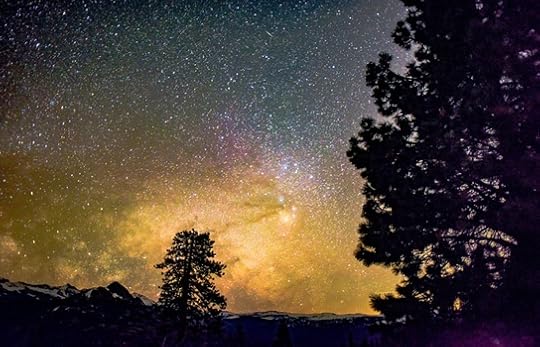
In my dialogues with lifelong evangelicals, I’ve found that a surprisingly large number apparently believe they will spend eternity as disembodied spirits. I sometimes ask, “You do believe in the resurrection, right?” They will say yes, knowing they should, but they go right on to question whether in the eternal Heaven on the New Earth there could be eating and drinking, swimming, running, biking, hugging, reading, painting, and any other activities embodied human beings do.
God’s revelation concerning the resurrection and the New Earth—our forever home—eludes them. A Christian university professor wrote, “I was floored and dismayed to discover the vast majority of my students don’t believe in the bodily resurrection.” Some evangelicals even believe we become angels when we die!
In contrast, Job says of his Messiah, “But as for me, I know that my Redeemer lives, and he will stand upon the earth at last. And after my body has decayed, yet in my body I will see God! I will see him for myself. Yes, I will see him with my own eyes. I am overwhelmed at the thought!” (Job 19:25-27, NLT). Read those words carefully. What else besides a literal physical resurrection can this mean?
When I shared these thoughts on Facebook, a reader commented: “My faith was almost shipwrecked until I figured this out.”
Someone said, “I’m asking in complete sincerity, how did believing that we will inhabit the earth save your faith?”
She wrote in response,
About two years ago, I had been in a dark place for a lot of reasons. Things were starting to get a little better, but I was still pretty ambivalent towards God. When I realized that the Kingdom was about “restoring Eden” and not about “escaping to Heaven” I couldn’t stop marveling that this was a God that never had a Plan B.
My whole life I’d understood the gospel as God saying, “I gave you humans a home and you screwed it up. I guess I’ll let you live with me now.” Which pretty effectively dimmed my view of His glory.
Two years after that revelation, I still get a little giddy thinking about Eden as the unconquerable Plan A. And I have a little one-year-old girl named Eden who reminds me how good that Plan A is.
What a magnificent answer, in keeping with the wonderful words contained in Romans 8:19-23:
The sufferings of this present time are not worthy to be compared with the glory that will be revealed in us. The creation waits in eager expectation for the sons of God to be revealed. For the creation was subjected to frustration [curse]... in hope that the creation itself will be liberated from its bondage to decay and brought into the glorious freedom of the children of God....We know that the whole creation has been groaning as in the pains of childbirth right up to the present time. Not only so, but we ourselves, who have the firstfruits of the Spirit, groan inwardly as we wait eagerly for our adoption as sons, the redemption of our bodies.
The “redemption of our bodies” refers to the resurrection of the dead. Paul says that not only we, but “the whole creation” longs for and cries out for the earth-wide deliverance that will come with our bodily resurrection.
Think about it: As the entire creation, including animals and plants and nature itself, fell on humanity’s coat-tails, so the entire creation shall rise on our coat-tails, the beneficiary of Christ’s redemptive work and resurrection. As creation wasn’t only about us, so redemption is not only about us.
Do you find yourself sighing and groaning? Have you seen the look in the eyes of a suffering animal, and thought, creation cries out for deliverance? The text obviously includes the only beings besides humans that walk the earth that are capable of true suffering: the animals. Isaiah 11, 60, and 65 all depict animals on the New Earth, as does Ezekiel 47. Human beings and Earth are inseparably linked. Together we fell, together we shall rise.
We know instinctively there’s something better than life as we now know it. We catch glimmers of greatness; we have foretastes of joy, but they are elusive.
Sin and curse are not intrinsic to humanity—they are foreign to it. They are invaders, to be defeated. And one day God will transform the fallen human race into a renewed human race and the present earth into the New Earth. It’s a place that won’t be ruined by tsunami and floods and earthquakes and typhoons.
We will have new bodies, not non-bodies. We will live on a new earth, not a non-earth. A new car is first and foremost a car. It is not a non-car. A new earth will be first and foremost an earth, not a non-earth. That means we have a reference point by which to understand the New Earth. The current earth is bursting with clues suggesting what we will find on the New Earth.
Consider these re-words:
Redemption: buying back what was formerly owned
Reconciliation: regaining a friend
Renewal: making new again, restoring to an original state
Resurrection: becoming physically alive again, after death
Regeneration: being born again, having a new beginning
Restoration: bringing back the lost
A phrase from the hymn “Hallelujah, What a Savior!” says His job is “ruined sinners to reclaim.”
Reclaim is another re-word. It recognizes that God had a prior claim on humanity that was temporarily lost but is fully restored and taken to a new level in Christ. God is the ultimate salvage artist. He loves to restore things to their original condition—and make them even better. Just as someone strips old paint off an antique to restore it, so our Savior removes our sin and restores us to His original design.
“At the renewal of all things, when the Son of Man sits on his glorious throne, you who have followed me will also sit on twelve thrones, judging the twelve tribes of Israel” (Matthew 19:27-28). He could have said at the destruction of all things. But instead He said at the renewal of all things. “All things” means that this earth is bursting with suggestions of what the New Earth will be like. What will be eliminated are sin and suffering and death and curse!
This isn’t speculation, it’s exactly what Scripture tells us about the New Earth: “He will wipe every tear from their eyes, and there will be no more death or sorrow or crying or pain. All these things are gone forever” (Revelation 21:4, NLT). And lest we fail to understand how that relates to Eden we’re told, “No longer will there be any curse” (Revelation 22:3, NIV).
This isn’t restricted to the last book of the Bible. It’s something that is to inform and guide our dreams right now: “In keeping with his promise we are looking forward to a new heaven and a new earth, the home of righteousness” (2 Peter 3:13). A New Earth is a renewed earth, a reclaimed earth, a redeemed earth, a resurrected earth. That’s what awaits us!
In “Joy to the World,” Isaac Watts wrote:
No more let sins and sorrows grow
Nor thorns infest the ground;
He comes to make His blessings flow
Far as the curse is found.
How far does Christ’s redemptive work extend? Far as the curse is found. If redemption failed to reach the farthest boundaries of the curse, it would be incomplete. Our spirits, our bodies, Earth itself, the animal kingdom—all are under the curse, and will be delivered from the curse. God will not abandon His creation. He will redeem it.
And we will glorify Him by ruling over the physical universe, showing respect and benevolence for all we rule. The righteous potential of humanity will at last be revealed at our resurrection. We’ll be righteous people with incorruptible bodies. We will not be inhuman in eternity; we will be more fully human than we’ve ever been!
That takes me back to the comment, “Two years after that revelation [about God’s plan for a New Earth], I still get a little giddy thinking about Eden as the unconquerable Plan A.” Well, I also find myself excited and energized every day about God’s promise of the coming global Eden, a redeemed planet, the New Earth. And when I think about living there forever with Jesus, my Savior and King and closest friend, my heart sings. And more now than ever I also think of being with Nanci and all the family and friends who have gone before me and will follow after me.
Wow! My heart soars to consider it. I hope you will read The Promise of the New Earth and experience that tug toward that new world Jesus is preparing for us. And maybe you’ll want to share it as a gift to others, whether believers or unbelievers.
Now available exclusively from EPM: The Promise of the New EarthThe Promise of the New Earth combines solid biblical teaching gleaned from Randy Alcorn’s bestselling book, Heaven, with beautiful photography to create a gift book to be treasured.
Many Christians think about the present Heaven, where Christians go now when they die, but have never considered the future Heaven, after the resurrection, which will be a physical place occupied by physical people who will live forever with Jesus and all those who love Him.
One day, those who know Jesus really will experience Heaven on Earth.
This refreshed version of Randy’s book The Promise of Heaven features all new photographs and some brand-new content. It makes a wonderful gift, especially to those who are grieving or need to learn about our eternal hope in Jesus. Hardcover, 96 pages.
The Promise of the New Earth is available exclusively from Eternal Perspective Ministries for $11.99 (retail $19.99). Purchase 10 or more for $9.99 each.
Photo by Sam Goodgame on Unsplash

